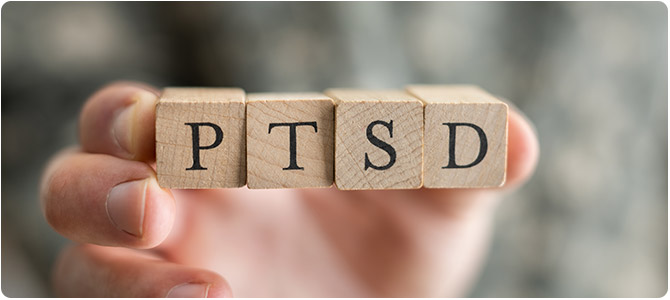PTSD Therapy Specialist in Phoenix, AZ
According to the National Center for PTSD, approximately 6% of the population will have PTSD at some point. PTSD is a psychiatric disorder that can occur in people who have experienced a traumatic event. The common signs of PTSD are nightmares, vivid flashbacks, physical reactions, and denial of events. Many people experience a traumatic event in their life, and some of them need a PTSD therapy specialist. If you are struggling with post-traumatic stress disorder, we have well-experienced therapists who can help. Dr. Courtney Gaines, a psychiatric nurse practitioner at Jade Health and Wellness, provides extra care in crisis, outpatient, and inpatient treatment areas. For more information, contact us today or book an appointment online. We are conveniently located at 2375 East Camelback RD Suite 600 Phoenix, AZ 85016.


Table of Contents:
What are the symptoms of post-traumatic stress disorder?
What does a therapist do for PTSD?
Can you do trauma therapy online?
How do I find a therapist for PTSD?
PTSD is known as post-traumatic stress disorder and can start within a month of a traumatic event that an individual has dealt with, there are other times when symptoms of post-traumatic stress disorder don’t appear until years after the event occurred.
The symptoms of post-traumatic stress disorder can cause severe issues with work, social situations, and even in relationships, not only post-traumatic stress disorder can havoc with your day-to-day life.
Post-traumatic stress disorder is categorized into four types which are:
1. Intrusive memories
• Recurrent or unwanted distressing memories from the traumatic event
• Constantly reliving the traumatic event
• Having dreams or nightmares that can be upsetting about the traumatic event
• Severe emotional distress or physical reactions to things that can remind you of the traumatic event
2. Avoidance
• Doing what you can to avoid thinking or even talking about the traumatic event
• Avoiding people, places, or things like activities that may remind you of the traumatic event
3. Negative changes in thinking and mood
• Negative thoughts occurring about the world, yourself, and others
• Hopelessness towards your future
• Memory issues, which may include not remembering important aspects of the traumatic event
• Difficulty keeping close relationships with people
• Feeling detached from close friends and family
• Less interest in activities you previously enjoyed
• Difficulty experiencing happy or positive emotions
• Feeling numb emotionally
4. Changes in physical and emotional reactions
• Startled or frightened easily
• Always on guard in case of danger
• Self-destructive behavior, like binge drinking, or excessive speed when driving
• Issues sleeping or falling asleep
• Issues concentrating
• Irritable, angry outbursts that occur or showcase aggressive behavior
• Feelings of guilt and shame that can be overwhelming
For children, age 6 years and younger, some of the signs and symptoms of post-traumatic stress disorder may include:
• Re-enacting the event or aspects of the traumatic event through play
• Dreams or nightmares that can be quite frightening, and may or may not include aspects of the traumatic event
A therapist will initially need to diagnose the patient to ensure they are dealing with PTSD, once the patient is diagnosed with PTSD, the therapist will recommend the following be completed:
• Doctor to perform a physical exam
• A psychological evaluation be completed
• Use the criteria from the diagnostic and statistical manual of mental disorders
Treatment can help with post-traumatic stress disorder in individuals and help them gain a sense of control over their life again. The primary treatment for post-traumatic stress disorder is psychotherapy; however, medication can also be used. Many doctors and therapists will recommend treatment with both to improve the symptoms by:
• Teaching the patient skills to address their symptoms
• Help the patient to think more positively about themselves, others, and the world
• Learn to cope if their symptoms arise again
• Treat other issues that can be related to traumatic experiences, which may include anxiety, depression, or misuse of drugs and alcohol
Any type of therapy can be provided and done online, it will take dedication and patience on behalf of the patient who is suffering from post-traumatic stress disorder and commitment to see the therapy through. Online therapy is easier, as it provides a much more comfortable and easy-going experience since you are in an area (your home) that you feel safe in while walking into a clinic can cause a lot of anxiety and stress.
If you are looking for a therapist to help with your post-traumatic stress disorder, the easiest method of searching would be to use a search engine like Google to find a therapist who offers treatment plans for post-traumatic stress disorder.
Type in search terms that are used often like “post-traumatic stress disorder treatment therapist near me” or “PTSD treatment therapist near me”. You should find many options available online with these search sentences. Jade Health and Wellness Center provides post-traumatic stress disorder treatments. If you are interested in how we can help, contact us today. We are conveniently located at 2375 East Camelback RD Suite 600 Phoenix, AZ 85016. We serve patients from Phoenix AZ, Scottsdale AZ, Paradise Valley AZ, Alhambra AZ, Tempe AZ, and surrounding areas.


Additional Services You May Need
▸ ADHD/ADD
▸ Anxiety Disorders
▸ Bipolar Disorders
▸ Borderline Personality Disorder
▸ Depression Disorders
▸ Eating Disorder
▸ Grief Therapy
▸ Life Coaching
▸ Men’s Mental Health
▸ Mental Health Therapy
▸ Mood Disorders
▸ OCD Disorders
▸ PTSD Disorders
▸ Panic Disorders
▸ Stress Disorders
▸ Talk Therapy
▸ Women’s Mental Health
▸ Social Phobia


